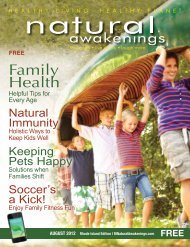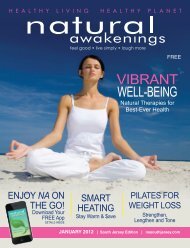TURN YOUR PASSION INTO A BUSINESS - Natural Awakenings
TURN YOUR PASSION INTO A BUSINESS - Natural Awakenings
TURN YOUR PASSION INTO A BUSINESS - Natural Awakenings
Create successful ePaper yourself
Turn your PDF publications into a flip-book with our unique Google optimized e-Paper software.
healingwaysBe SupplementSAVVYHow to Choose Wiselyfor Optimal Healthby James OcchiogrossoAccording to the U.S. Office of Dietary Supplements, nearlyhalf of us regularly use some kind of dietary supplement,including vitamins, minerals and botanical herbs.While mainstream mediahave recently targetedsupplements with alarmingcoverage about their value and safety,James J. Gormley, former editor ofBetter Nutrition and author of User’sGuide to Brain-Boosting Supplements,helps set the record straight.In an open letter on the Citizens forHealth website, at Tinyurl.com/Letter-Rebuttal, he contends the worst partabout misleading articles is that theycan scare readers away from benefitsthat safe supplements might offer. Henotes that although nothing in life is100 percent risk-free, supplements areinherently benign, while pharmaceuticaldrugs frequently have unhealthyside effects.Controversy over supplementsseems to arise primarily from misinformation.Following are some guidelinesand resources to help ensuretheir wise use and maximum benefit.Supplements VersusPharmaceutical Drugs<strong>Natural</strong> health practitioners reportthat their clients tend to mentallygroup pharmaceuticals and supplementstogether. However, pharmaceuticaldrugs are typically synthetic,single-action chemicals that targetone body system or organ, causing itto alter its function; they mask symptoms,but do not cure disease. Onthe other hand, the goal of vitamins,minerals and plant-derived supplementsis to provide nutrients to helpa troubled body system by supportinghealth and healing.Some confusion occurs becausemany pharmaceutical and supplementmanufacturers take advantageof people’s desire for a one-bulletsolution, which rarely exists in eithersource. Stephen Lawson, administrativeofficer of the Linus PaulingInstitute, at Oregon State University,maintains that, “Lumping togetheritems like vitamins, minerals andbotanicals, each of which can haveprofoundly different physical profilesand effects on the body, is dangerousand misleading.”Who Needs Supplements?Everyone can benefit from taking theright supplements to address specifichealth needs. Numerous studies attestthat many diseases, especially inolder adults, are caused by a deficiencyof certain vitamins or minerals. Forexample, pernicious anemia, commonin adults over the age of 60, is due toa long-term deficiency of vitamin B 12.The condition often proved fatal untilresearchers discovered that takingsuch supplements could effectivelytreat it.Another common nutritionaldeficiency disease among aging adultsis osteoporosis, a loss of bone mineralsthat often leads to fractures. Itsprimary cause is chronic deficienciesin calcium and vitamin D levels.The latter is crucial for absorbingcalcium—a primary mineral for buildingbone. According to the NationalInstitutes of Health, older adults arelikely to spend more time indoors,plus, even when they are exposed tothe sun, their skin does not synthesizevitamin D as efficiently as when theywere younger.Serious nutrient deficienciesrarely cause fatal outcomes, but deficienciesof certain vitamins and mineralscan deter organs from optimalfunctioning. General medical testsdo not always show minor shortfalls,and practice shows that supplementingwith the appropriate vitamin ormineral can often both eliminatesymptoms and resolve an underlyingproblem.Choosing HelpfulSupplementsDetermining which supplements canbest meet individual needs requiressound information. First, determineif a perceived condition could becaused by a vitamin or mineral deficiency,and then identify the bestdosage. It is also vital to know how asupplement might interact with anycurrent medications.Most vitamin and mineral supplementsare safe when used properly,but always consider asking an experiencedprofessional for guidance; this isespecially true for botanicals, becausesome manufacturers make unsupportedclaims based only on their ownresearch. Generally, nonprofit organizationssuch as the Linus Pauling Institute(lpi.OregonState.edu) that do not sell supplementproducts, present unbiased information.18 www.wncmountainsna.com




